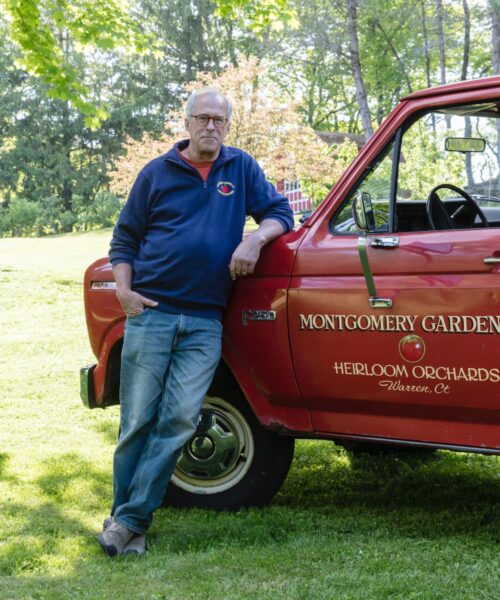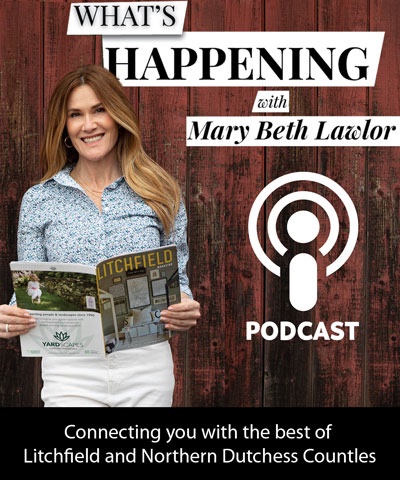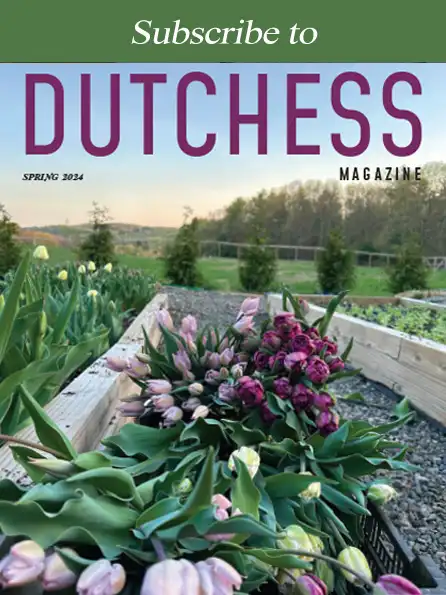April 26, 2023
A Warren-based Gardener is an Outspoken Advocate for the Forbidden Fruit
By Tovah Martin
Peter Montgomery wants to make sure you don’t go hungry. More specifically, he feels certain that if everyone in Litchfield County grew an apple tree, we wouldn’t starve—no matter what the future brings. Basically, Montgomery is one of Litchfield County’s greatest apple proponents. Maybe he doesn’t rank right alongside Eve as an apple pusher—that designation might more rightfully fall to Johnny Appleseed (aka John Chapman, native son of Leominster, MA). Johnny Appleseed reputedly went barefoot and clad in a gunny sack with a saucepan for a hat and planted his first orchard in 1800, gradually expanding to 1,200 acres of fruit trees throughout Pennsylvania, Ohio, and Indiana. He died in 1845 of pneumonia after navigating a snowstorm to fix a fence around a far-flung orchard. More modestly, Peter Montgomery is working on populating his 2+ acres in Warren with fruit trees but he’s no less outspoken on the subject.
In the initiative to stave off starvation, Montgomery is on solid historic ground. Homegrown stored apples were once a major winter food source to sustain a hungry family. And, as Peter Montgomery is quick to explain, cider was a lifesaver at a time when water quality wasn’t predictable. For those reasons, most early settlers in this country planted homestead apples, brought with them from Europe. In America, ‘Roxbury Russet’ was the first apple on record to be cultivated, hailing from Roxbury, MA and introduced into Connecticut in 1649.

Peter Montgomery’s personal portal to apples began in 2005 when he moved to Litchfield County from California and found the region lacking in the fresh fruit that was bountiful at West Coast farmer’s markets. Most specifically, he missed Asian pears and swung immediately into planting half a dozen trees. Apparently, Montgomery does not accept failure without a fight, because when five of those trees immediately died, he pivoted into research mode and replanted. His message to newbie home orchardists is to test their soil and obtain a complete profile of nutrients, etc. When he discovered that his soil was far too acidic to host Asian pears and apples, he went to work amending with dolomitic limestone until he achieved the pH of 6.5 that apples prefer. Currently, Montgomery applies organic nutrients to his soil three times a year to serve up the boost that apples love. His personal orchard is an eclectic mix of heirloom apple varieties such as ‘Esopus Spitzenburg’ (early 18th Century), ‘Summer Rambo’ (1767), and ‘Cox’s Orange Pippin’ (1825) mixed with more recent introductions such as ‘Melrose,’ ‘Jonagold,’ and ‘Honeycrisp.’ The collection also includes boutique apples like ‘Redfield’ producing tart fruit with bright red flesh surrounding a pearly white heart and ‘Arkansas Black’ a variety that is rock hard before three months of cold storage renders it edible.
Wind Peter Montgomery up, and he will launch into a history of the apple that begins 2 million years ago in the Tien Shan Mountain range of Kazakhstan. When he brings it all home to Connecticut, he’ll start with the glaciers 17,000 years ago to explain the regional soils. When he swings into anti-starvation mode, he’s armed with specific cider data—and homemade cider is a favorite offshoot of his personal apple enterprise. “A bushel of apples will produce two gallons of cider. A pioneer family would optimally produce 50 gallons of cider per person to survive the winter.” Although his young Warren Eden is not yet capable of that yield, he’s working on it. And if you figure in his other berry, fruit, and permaculture crops, he hopes to be self-sufficient in the fruit department sometime in the future. Meanwhile, he wants to spread the love for apples. Just one bite of a homegrown fruit, and he feels certain you’ll succumb to temptation.






















